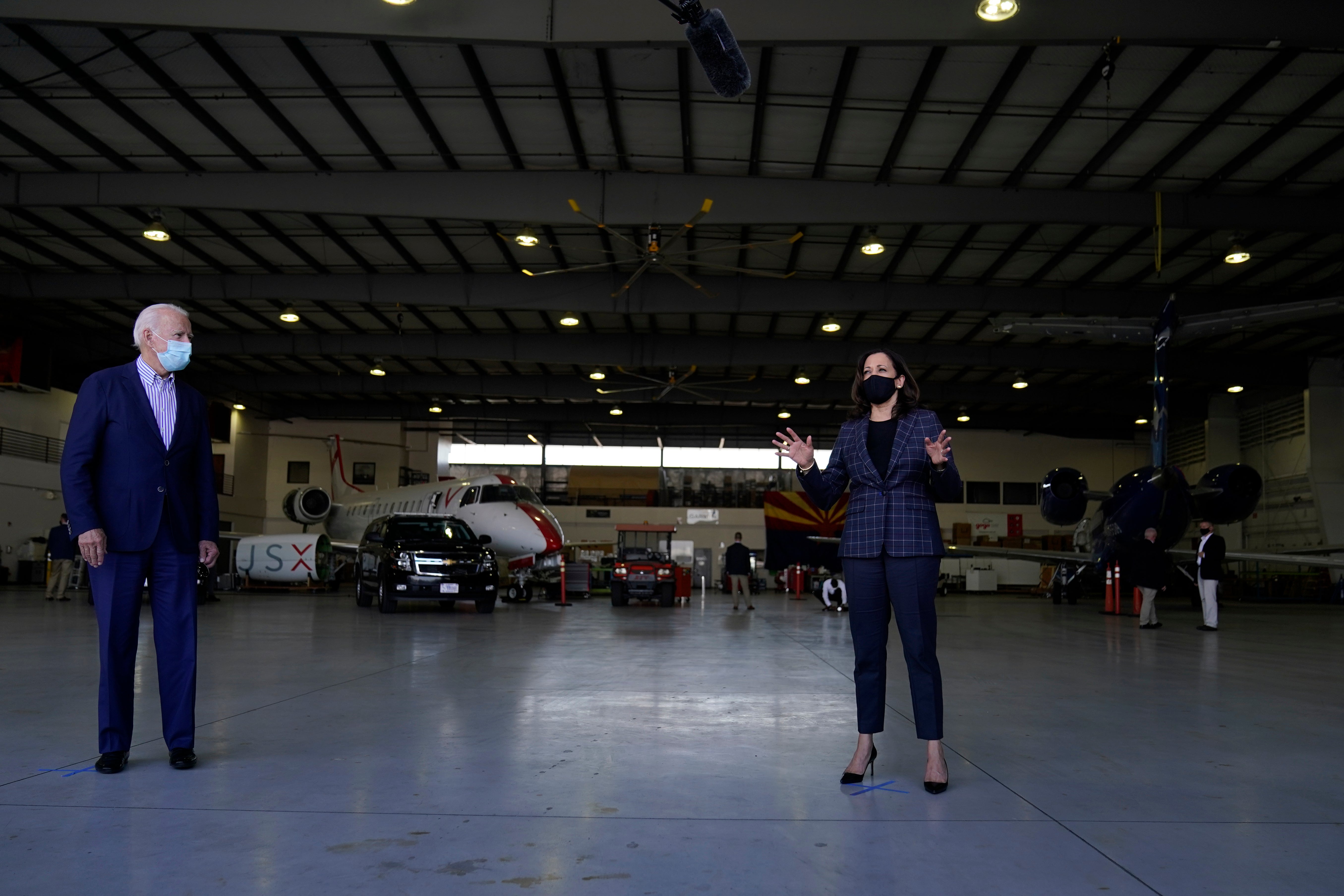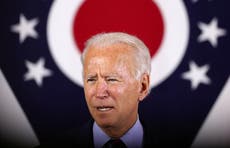How a Biden-Harris administration might change the Middle East
A Joe Biden presidency could dramatically alter America’s position on a number of issues across the region, reports Bel Trew


One of the strangest motifs across Israel’s recent string of legislative elections was enthusiastic supporters of prime minister Benjamin Netanyahu waving Donald Trump flags.
Without fail, throughout the three extraordinary votes, Trump’s “Keep America Great 2020” banners appeared in Netanyahu rallies and party headquarters.
Never before had an American president’s campaign posters been almost as ubiquitous as those belonging to the Israeli candidates themselves.
To Mr Netanyahu’s followers, Mr Trump’s support seemed as vital to the success of a right-wing Israel as the re-election of the Israeli prime minister himself, who has repeatedly referred to Trump as the “greatest friend” the country has ever had.
And so, concern is growing as US polls increasingly show that former vice president Joe Biden might win the presidency. According to a recent survey by Israeli news channel I24, only a paltry 18.8 per cent of the country want that outcome to happen.
In fact, a Biden win, with Kamala Harris by his side, could potentially reconfigure the US posture across the Middle East and North Africa, drastically impacting Trump’s closest allies like Israel, Saudi Arabia and the UAE but also his enemies like Iran.
What would a Biden-Harris administration look like?
One of the safest bets is the US rejoining the 2015 Iran nuclear deal, according to Bruce Riedel, a senior fellow at Brookings and an ex-advisor to four US presidents on the Middle East. Trump infamously pulled out of the Joint Comprehensive Plan of Action in 2018 in favour of a campaign of “maximum pressure” and sanctions, which Biden dismissed as a “reckless” action that has made America less safe.
Both Biden and Harris have made it clear that while the current nuclear deal is flawed, it is “the best existing tool” to curb Tehran’s nefarious nuclear intentions.
Both were vocal critics of the US strike that killed top Iranian General Qassem Soleimani in Iraq in January. In the aftermath Harris even co-sponsored legislation aiming to prevent funds to the Pentagon being used in military action against Iran.
This policy shift will no doubt be welcomed by Tehran and could mean a reduction in Iran-backed militia attacks on US military bases in Iraq. But it will deal a blow to Israel, which has repeatedly lauded Trump for his “courageous” hardline stance on the Islamic Republic.
Mr Netanyahu may be further troubled by a potential US reconciliation with the Palestinians, who cut ties with Washington when Trump announced in 2017 he would move the US embassy to Jerusalem, recognising the contested city as Israel’s capital.
Trump’s policy on Israel is steered by the strong ideologies of his closest cadres including staunchly pro-settlement David Friedman, his former bankruptcy lawyer turned ambassador to Israel.
The Trump administration authored a peace deal which was labelled the most pro-Israel vision for the region, and sketched a Palestinian “state” with no sovereignty . He also slashed all funding to the UN’s Palestinian refugee agency and ditched America’s long-established view that Israeli settlements in the West Bank are “inconsistent” with international law.
In January Friedman appeared to green light the immediate annexation of swathes of the occupied West Bank, despite it too being a violation of international law.
On the other hand, in recent months the Trump administration has appeared to have pulled off the impossible, brokering deals which have seen the United Arab Emirates, Bahrain and even Sudan recognise Israel – sparking the fury of the fractured Palestinian leadership that is united in its condemnation of the agreements as a “stab in the back”.
President Trump has insisted five more countries are likely to follow suit, with all eyes on whether Oman might be the next Arab country to accept Israel and benefit from trade and diplomatic relations.
Biden, on the other hand, has made it clear he does not support annexation and that he would “reverse” Trump administration steps, slamming settlement activity as “choking off any hope of peace”.
It is unlikely he would move the embassy back to Tel Aviv or do anything to jeopardise the new Israel deals with the Gulf and Sudan.
But he has pledged to reinstate US assistance to Palestinians (provided payments do not go to “terrorists in Israeli jails”), to reopen the US consulate in East Jerusalem, and work on reopening the offices of the Palestinian Liberation Organisation in Washington as well.
That said, Israeli commentators have taken a careful look at Kamala Harris, whose pro-Israel stance could, according to one piece, “tip US-Israel ties” amid reports she will be handed an unusually active and prominent role as VP: if he is inaugurated in January, Biden at 78 will become the oldest US president in history.
One of her first acts as senator for California was to co-sponsor a 2017 bill objecting to UN Security Council resolution 2334 that condemned Israeli settlements in the occupied West Bank and East Jerusalem.
In November of the same year, Harris visited Israel and met Netanyahu after which Harris’s then campaign communication manager told McClatchy that her “support for Israel is central to who she is”.
Harris has recently come under fire from left-wing democrats for her strong ties with the American Israeli Public Affairs Committee (AIPAC) that she has addressed three times in three years.
But like most Democrats, she has opposed plans by Mr Netanyahu to imminently annex the occupied West Bank, penning a June letter to Trump saying it would “impede the prospects for a negotiated two-state solution”.
And so, perhaps the biggest policy shift concerns Trump’s ally of Saudi Arabia.
To mark the anniversary of the murder of Saudi dissident, columnist and US resident Jamal Khashoggi, Biden released a statement saying should he become president he would “reassess” America’s relationship with the Kingdom, end US support for Saudi Arabia’s ruinous war in Yemen and “make sure America does not check its value at the door to sell arms or buy oil”.
Harris, meanwhile, has co-sponsored legislation demanding a public report on the intelligence community’s finding on Khashoggi’s murder and in 2019 voted in favour of a resolution blocking arms sales to the Kingdom.
According to Bob Woodward’s latest book President Trump, instead, has bragged he “saved” Crown Prince Mohammed Bin Salman who US intelligence services believe ordered the attack.
“I saved his ass,” Trump is reported to have said. “I was able to get Congress to leave him alone.”
That said Trump’s somewhat chaotic approach to foreign policy – which saw dramatic and sometimes contradictory shifts in decision-making – will not be missed by even his staunchest allies.
Trump pulled out of the Iran deal, slapped harsh sanctions on Tehran but then did little in 2019 when Saudi oil facilities were attacked by the Iran-backed Houthis and Gulf shipping traffic came under pressure by Iranian forces.
Then in January he alarmed the entire world when he told Congress to follow his Twitter account for updates on a potential war with Iran.
“I see the last four years as exacerbating the anxiety that some regional partners already had about US commitments in the region,” explains Tamara Cofman Wittes, a senior fellow at Brookings and former deputy assistant secretary of state for Near Eastern affairs.
“On top of whatever concerned them about Obama, now they had this guy who professes his concern, but changes his mind overnight without consulting them, on issues that profoundly affect their security,” she continues.
Despite worries about Biden’s shift in policy she believes anything that increases the “clarity, credibility, and commitment of US policy would be a plus for the local partners”.
While countries like Saudi Arabia, the UAE and Egypt will bristle over Biden’s expected condemnations of their human rights records, it is unlikely he would take firm action and they’ll welcome predictability.
Meanwhile, the least amount of change may be in Syria and Iraq.
“As long as the Iraqi government as a whole says that the US troops can stay, I don’t think either Trump or Biden want them to go,” says Robert S Ford, a senior fellow at the Middle East Institute in Washington and a former US ambassador to Syria until 2014.
“The same applies to Syria, especially as it is only a small presence.”
Trump’s calls to bring the troops home is not unique, it resonates across America’s political spectrum and factions.
For Biden if he wins, the Middle East is absolutely positively not a priority
Despite being a supporter of the 2003 invasion of Iraq and in 2007 the federalisation of the country, Biden will likely pursue a hands-off approach for Iraq, as he has also pledged to stop long-term military entanglements like Afghanistan that have bedeviled US presidents. He has talked about leaving around 2,000 troops behind in Iraq, which many believe would – in reality – be the number stationed under a Trump administration.
A Biden presidency would, however, be less likely to ignore the wellbeing of Syrian Kurdish factions, as Trump was accused of doing just days ahead of Turkey’s controversial incursion into northern Syria last autumn.
Biden’s strong ties with the Kurdish leadership has sparked the wrath of Ankara that may have frostier ties with Washington if he is elected.
It’s already showing. In August, an eight-month-old video of Biden outlining his plans for Turkey resurfaced in Turkish media, sparking uproar.
In the interview with The New York Times, Biden described Turkey’s president Recep Tayyip Erdogan as an “autocrat” and suggests the US should “embolden” his opponents to defeat him in elections. It prompted a reaction from Ibrahim Kalin, a senior Erdogan adviser, who denounced Biden’s comments on Twitter as “based on pure ignorance, arrogance and hypocrisy”.
That said in a global recession with a pandemic on his hands, the Middle East will not be the focus for a freshly elected Biden.
Covid-19, healthcare, the economy and healing the polarisation of the Trump years will overshadow everything.
Ford, a long-serving former diplomat fluent in Arabic and with an expertise in the Middle East and North Africa, says Trump focuses on the region and his foreign policy “wins”, including the divisive Palestinian-Israeli peace deal, the Gulf-Israeli agreements and, most recently, Sudan’s recognition of Israel, as a “useful distraction” from tricky subjects.
“Trump doesn’t want to talk about the virus, he can’t talk about the economy this year, he can only talk about what it used to be,” he says.
“For Biden if he wins, the Middle East is absolutely positively not a priority.”
Subscribe to Independent Premium to bookmark this article
Want to bookmark your favourite articles and stories to read or reference later? Start your Independent Premium subscription today.



Join our commenting forum
Join thought-provoking conversations, follow other Independent readers and see their replies
Comments